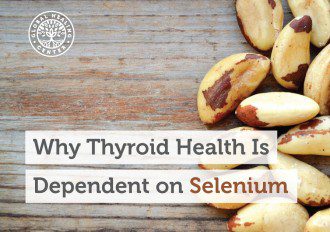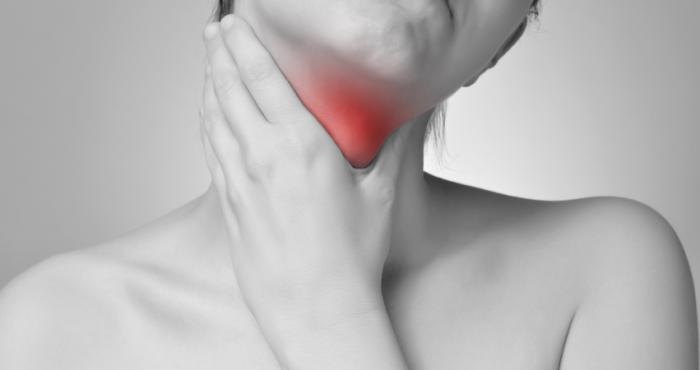22nd July 2016
Guest writer for Wake Up World
The thyroid is essential to some of the body’s most critical processes, including the development of the nervous and skeletal systems.[1] For the thyroid to function normally, it must receive the right nutrition, and that means getting enough selenium. Selenium is an essential mineral[2] and being deficient can lead to serious health problems such as Keshan disease[3], myxoedematous cretinism[4], Graves’ disease[5], and even thyroid destruction.[6]
Although the body requires selenium, it does not produce selenium and you must get it through your diet. For most people, this isn’t a problem since many common foods are a good source of selenium. Additionally, selenium is available as a nutritional supplement.
[pro_ad_display_adzone id=”110028″]
Regardless of the source, selenium is a critical nutrient for the body and nowhere is this more evident than the thyroid. In fact, the thyroid has more selenium content per gram than any other organ. It’s also home to certain proteins called selenoproteins[7] which contain selenium-based amino acids.
Before I discuss why this is so important to thyroid health, let’s first understand exactly what the thyroid does.
What Is a Thyroid?
Your thyroid is part of your endocrine system and one of the most crucial glands in your body. Located at the base of your throat, the thyroid produces the hormones that play a major role in your body’s growth, maturation, and metabolic processes.[8, 9, 10]
The thyroid hormones produced by the thyroid are triiodothyronine (T3)[11], tetraiodothyronine (T4)[12], and calcitonin.[13] T3 and T4 are critical for a normal metabolism.[14] T4 also supports normal brain function[15], while calcitonin promotes normal bone growth.[16]
How to Support Thyroid Health
There are a few simple steps you can take to support your thyroid. It is imperative that you minimize your stress levels. Stress is actually a hormone response that may negatively impact thyroid function.[17] Exercise is a natural and extremely effective way to combat stress.[18] Exercise can also help stimulate the secretion of thyroid hormones.[19]
Getting enough sleep also helps support a healthy thyroid.[20] Thyroid hormones can directly impact sleep quality.[21] Avoiding toxins like BPA, fluoride, and pesticides is also a smart strategy as they can have a detrimental effect on the thyroid.[22, 23, 24]
Following a balanced diet is one of the easiest ways to support your thyroid. Eat selenium-rich foods, as well as iodine-rich foods, as both are necessary for the synthesis of thyroid hormones.[25] While you’re at it, don’t forget about vitamin A, which also helps support normal thyroid health.[26] When considering your diet, incorporate gluten-free grains since gluten has been associated with autoimmune thyroid diseases.[27]
What Selenium Does for the Thyroid
The importance of selenium for your thyroid cannot be overstated. Most people know that iodine is critical to thyroid health. Selenium is less famous but equally important. Along with iodine and vitamin A, selenium helps remove thyroid-harming substances and supports normal thyroid structure.[7]
Thyroid hormone metabolism is impaired without selenium because iodine-based enzymes, called iodothyronine deiodinases, cannot be synthesized.[28] Iodothyronine deiodinases exist in several forms and are not yet fully understood, but do seem to play a role in preventing hypothyroidism.[29] These enzymes are essential for the activation of thyroid hormones. So, while iodine tends to get most of the credit for thyroid health, it cannot actually carry out its function without help from selenium.
Your body does not produce its own selenium. All selenium must be obtained through food or supplements. Once ingested, the element is broken down into enzymes called selenoproteins.[30] These enzymes exist in many forms, but two of the best understood are glutathione peroxidase (GPx) and thioredoxin reductase (TRx). The GPx and TRxenzymes promote antioxidant abilities on a cellular level.[31] TRx also aids in cell growth and helps process dehydroascorbic acid into vitamin C.[32] None of these vital enzymes could exist without selenium.
Selenium has also been shown to combat several thyroid-debilitating conditions.
How the Thyroid Relies on Selenium to Ward Off Disease
Common thyroid maladies can be caused by low selenium intake, including Hashimoto’s thyroiditis.[33] With this condition, the thyroid first becomes inflamed and secretes excessive amounts of hormones. Then, over time, it starts producing far less than it needs.
[pro_ad_display_adzone id=”110028″]
Conditions like thyroiditis can lead to an imbalance of hormones and that can be the start of major disruptions in the body’s normal processes. Hypothyroidism, which is one such potential consequence, is a condition in which the thyroid fails to provide a sufficient level of thyroid hormones.[34] The outcome can be serious and include abnormal heartbeat[35], low body temperature[36], and nervous system disorders.[37] It can even disrupt the body’s ability to metabolize proteins, carbohydrates, and fats.[38] What can contribute to hypothyroidism? You guessed it, selenium deficiency.[39]
Role of Selenium in Nutrition
If thyroid health is important to you, you cannot overlook the importance of selenium. The body is made up of many parts that work together. Each part must be fueled with essential nutrients like selenium. In addition to supporting thyroid health, selenium also plays a role in combating free radicals. To learn more about how selenium supports your body, check out how selenium plays a role in human nutrition.
What do you do to ensure you get enough selenium? Let us know in the comments, or join the conversation on Facebook.
References:
- Nussey, Stephen, and Saffron A. Whitehead. “Chapter 3: The Thyroid Gland.”Endocrinology: An Integrated Approach. Oxford, UK: Bios, 2001. N. pag. Print.
- Rayman, Margaret P. “Selenium and Adverse Health Conditions of Human Pregnancy.” Selenium (2011): 531-44. Web.
- Chen, J. “An Original Discovery: Selenium Deficiency and Keshan Disease (an Endemic Heart Disease).” An Original Discovery: Selenium Deficiency and Keshan Disease (an Endemic Heart Disease) 21.3 (2012): 320-26. Web.
- Contempre, B., J. E. Dumont, J.-F. Denel, and M.-C. Many. “Effects of Selenium Deficiency on Thyroid Necrosis, Fibrosis and Proliferation: A Possible Role in Myxoedematous Cretinism.” European Journal of Endocrinology 133.1 (1995): 99-109. Web.
- Dharmasena, Aruna. “Selenium Supplementation in Thyroid Associated Ophthalmopathy: An Update.” International Journal of Ophthalmology 7.2 (2014): 365–375. PMC. Web. 30 Mar. 2016.
- Contempré, Bernard, Gabriella Morreale De Escobar, Jean-François Denef, Jacques Emile Dumont, and Marie-Christine Many. “Thiocyanate Induces Cell Necrosis and Fibrosis in Selenium- and Iodine-Deficient Rat Thyroids: A Potential Experimental Model for Myxedematous Endemic Cretinism in Central Africa.” Endocrinology 145.2 (2004): 994-1002.PubMed. Web. 30 Mar. 2016.
- Drutel, Anne, Françoise Archambeaud, and Philippe Caron. “Selenium and the Thyroid Gland: More Good News for Clinicians.” Clin Endocrinol Clinical Endocrinology 78.2 (2013): 155-64. PubMed. Web. 30 Mar. 2016.
- Thomopoulos, P. “[Thyroid Hormone Production and Its Regulation].” Rev Prat. 48.18 (1998): 1987-991. PubMed. Web. 30 Mar. 2016.
- Mullur, Rashmi, Yan-Yun Liu, and Gregory A. Brent. “Thyroid Hormone Regulation of Metabolism.” Physiological Reviews 94.2 (2014): 355–382. PMC. Web. 30 Mar. 2016.
- “How Does the Thyroid Work?” PubMed Health. U.S. National Library of Medicine, 7 Jan. 2015. Web. 30 Mar. 2016.
- Schroeder, Amy C., and Martin L. Privalsky. “Thyroid Hormones, T3 and T4, in the Brain.” Frontiers in Endocrinology 5 (2014): 40. PMC. Web. 30 Mar. 2016.
- “T4 Test: MedlinePlus Medical Encyclopedia.” Medline. U.S. National Library of Medicine, 10 May 2014. Web. 30 Mar. 2016.
- Inzerillo, Angela M., Mone Zaidi, and Christopher L.-H. Huang. “Calcitonin: The Other Thyroid Hormone.” Thyroid 12.9 (2002): 791-98. PubMed. Web. 30 Mar. 2016.
- “T3 Test: MedlinePlus Medical Encyclopedia.” MedlinePlus. U.S. National Library of Medicine, 10 May 2014. Web. 30 Mar. 2016.
- Smith, J. “Thyroid Hormones, Brain Function and Cognition: A Brief Review.”Neuroscience & Biobehavioral Reviews 26.1 (2002): 45-60. Web. 30 Mar. 2016.
- Shiba, R. “[The Effect of Calcitonin on Contractile Function of Skeletal Muscles (author’s Transl)].” Nihon Seikeigeka Gakkai Zasshi. 53.11 (1979): n. pag. PubMed. Web. 30 Mar. 2016.
- Mizokami, Tetsuya, Audrey Wu Li, Samer El-Kaissi, and Jack R. Wall. “Stress and Thyroid Autoimmunity.” Thyroid 14.12 (2004): 1047-055. PubMed. Web. 30 Mar. 2016.
- Sharma, Ashish, Vishal Madaan, and Frederick D. Petty. “Exercise for Mental Health.”Primary Care Companion to The Journal of Clinical Psychiatry 8.2 (2006): 106. Print.
- Ciloglu, F., I. Peker, A. Pehlivan, K. Karacabey, N. Ilhan, O. Saygin, and R. Ozmerdivenli. Exercise intensity and its effects on thyroid hormones. Neuro Endocrinol Lett 26.6 (2005): 830-34. PubMed. Web. 30 Mar. 2016.
- Gary, KA, and Et Al. “Total Sleep Deprivation and the Thyroid Axis: Effects of Sleep and Waking Activity.” Aviat Space Environ Med. 67.6 (1996): 513-19. PubMed. Web. 30 Mar. 2016.
- Steiger, A. “[Thyroid Gland and Sleep].” Acta Med Austriaca 26.4 (1999): 132-33. PubMed. Web. 30 Mar. 2016.
- Chevrier, Jonathan et al. “Maternal Urinary Bisphenol A during Pregnancy and Maternal and Neonatal Thyroid Function in the CHAMACOS Study.” Environmental Health Perspectives 121.1 (2013): 138–144. PMC. Web. 30 Mar. 2016.
- Singh, Navneet et al. “A Comparative Study of Fluoride Ingestion Levels, Serum Thyroid Hormone & TSH Level Derangements, Dental Fluorosis Status among School Children from Endemic and Non-Endemic Fluorosis Areas.” SpringerPlus 3 (2014): 7. PMC. Web. 30 Mar. 2016.
- Mnif, Wissem et al. “Effect of Endocrine Disruptor Pesticides: A Review.” International Journal of Environmental Research and Public Health 8.6 (2011): 2265–2303. PMC. Web. 30 Mar. 2016.
- Woeber, KA. “Iodine and Thyroid Disease.” Med Clin North Am 75.1 (1991): 169-78. PubMed. Web. 30 Mar. 2016.
- Farhangi, Mahdieh Abbasalizad, Seyyed Ali Keshavarz, Mohammadreza Eshraghian, Alireza Ostadrahimi, and Ali Akbar Saboor-Yaraghi. “The Effect of Vitamin A Supplementation on Thyroid Function in Premenopausal Women.” Journal of the American College of Nutrition31.4 (2012): 268-74. PubMed. Web. 30 Mar. 2016.
- Ch’ng, Chin Lye, M. Keston Jones, and Jeremy G. C. Kingham. “Celiac Disease and Autoimmune Thyroid Disease.” Clinical Medicine & Research 5.3 (2007): 184–192. PMC. Web. 30 Mar. 2016.
- Gereben, Balázs, Elizabeth A. Mcaninch, Miriam O. Ribeiro, and Antonio C. Bianco.“Scope and Limitations of Iodothyronine Deiodinases in Hypothyroidism.” Nat Rev Endocrinol Nature Reviews Endocrinology11.11 (2015): 642-52. PubMed. Web. 30 Mar. 2016.
- Arthur, John R., Fergus Nicol, and Geoffrey J. Beckett. “The Role of Selenium in Thyroid Hormone Metabolism and Effects of Selenium Deficiency on Thyroid Hormone and Iodine Metabolism.” Biological Trace Element Research Biol Trace Elem Res 34.3 (1992): 321-25. PubMed. Web. 30 Mar. 2016.
- Brown, Km, and Jr Arthur. “Selenium, Selenoproteins and Human Health: A Review.”Public Health Nutrition PHN 4.2b (2001): n. pag. PubMed. Web. 30 Mar. 2016.
- Baker, R.d., S.s. Baker, K. Larosa, C. Whitney, and P.e. Newburger. “Selenium Regulation of Glutathione Peroxidase in Human Hepatoma Cell Line Hep3B.”Archives of Biochemistry and Biophysics 304.1 (1993): 53-57.PubMed. Web. 30 Mar. 2016.
- Mustacich, D, and G Powis. “Thioredoxin Reductase.” Biochemical Journal346.Pt 1 (2000): 1–8. Print.
- Zagrodzki, P., and J. Kryczyk. “[The Importance of Selenium in Hashimoto’s Disease].” Postepy Hig Med Dosw 68 (2014): 1129-137. PubMed. Web. 30 Mar. 2016.
- “Hypothyroidism: MedlinePlus Medical Encyclopedia.” MedlinePlus. U.S. National Library of Medicine, 2015. Web. 30 Mar. 2016.
- Celik, Atac, Pelin Aytan, Huseyin Dursun, Fatih Koc, Kerem Ozbek, Mustafa Sagcan, Hasan Kadi, Koksal Ceyhan, Orhan Onalan, and Ersel Onrat. “Heart Rate Variability and Heart Rate Turbulence in Hypothyroidism before and after Treatment.” Annals of Noninvasive Electrocardiology16.4 (2011): 344-50. PubMed. Web. 30 Mar. 2016.
- Kostoglou-Athanassiou, I, and K Ntalles. “Hypothyroidism – New Aspects of an Old Disease.” Hippokratia 14.2 (2010): 82–87. Print.
- Khedr, Eman M., Lobna F. El Toony, Mohamed N. Tarkhan, and Gamal Abdella.“Peripheral and Central Nervous System Alterations in Hypothyroidism: Electrophysiological Findings.” Neuropsychobiology41.2 (2000): 88-94. PubMed. Web. 30 Mar. 2016.
- Pucci, E., L. Chiovato, and A. Pinchera. “Thyroid and Lipid Metabolism.” Int J Obes Relat Metab Disord 24.2 (2000): S109-112. PubMed. Web. 30 Mar. 2016.
- Pizzulli, Antonio, and Alireza Ranjbar. “Selenium Deficiency and Hypothyroidism : A New Etiology in the Differential Diagnosis of Hypothyroidism in Children.” BTER Biological Trace Element Research77.3 (2000): 199-208. PubMed. Web. 30 Mar. 2016.
About the author:
Dr. Edward F. Group III (DC, ND, DACBN, DCBCN, DABFM) founded Global Healing Center in 1998 and is currently the Chief Executive Officer. Heading up the research and development team, Dr. Group assumes a hands-on approach in producing new and advanced degenerative disease products and information.
Dr. Group has studied natural healing methods for over 20 years and now teaches individuals and practitioners all around the world. He no longer sees patients but solely concentrates on spreading the word of health and wellness to the global community. Under his leadership, Global Healing Center, Inc. has earned recognition as one of the largest alternative, natural and organic health resources on the internet.
For more information, please visit Global Healing Center.
Recommended articles by Dr. Group:
- The 9 Best Fermented Foods for Your Gut
- 14 Foods that Cleanse the Liver
- How Turmeric Keeps You Looking Young
- 7 Toxins Harming Your Brain Right Now
- Top 5 Foods for the Pineal Gland
- 6 Things You Must Know About Colloidal Silver
- The Importance of a Kidney Cleansing Diet
- The 9 Best Herbs for Lung Cleansing and Respiratory Support
- 7 Best Foods to Support Kidney Function
- Lung Cleansing With Peppermint Oil
- How Fluoride Damages Pineal Gland Health
Please note: All information and statements made are for education purposes and are not intended to replace the advice of a healthcare professional. Neither Global Healing Center nor Wake Up World dispenses medical advice, prescribes, or diagnoses illness.
[pro_ad_display_adzone id=”110027″]









